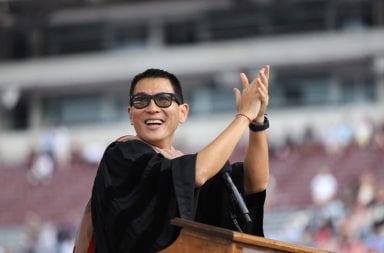
Jennifer Schlegel, a fifth-year in biomedical engineering, is the founder of BeEnabled, an organization funding accessibility-focused projects. Credit: Courtesy of Nichole Lauren Photography
How do you code if you can’t use a keyboard? How do you write if you can’t hold a pencil? Jennifer Schlegel, a fifth-year in biomedical engineering, is working on the answer.
Schlegel was born prematurely with spastic diplegic cerebral palsy, a condition that affects muscle control and coordination. The self-proclaimed “accidental founder” said math and science were never her strong suits, and she stumbled into engineering after trying to find ways to overcome obstacles in her everyday life.
“I was just running around basic life problems like, ‘Oh, I got the door stuck behind me. I guess I gotta go find a coat hanger so I can get out of this room,’” Schlegel said.
When it came time for college, Schlegel said she did not receive the same encouragement her two older sisters did.
“It was kind of like no one had any idea what I might be capable of, so no one really pushed for it,” she said.
However, during her time at Ohio State, Schlegel has taken on numerous roles across several organizations. She is a University Innovation Fellow, a worldwide program for students to encourage campus engagement with innovation, creativity, design thinking and entrepreneurship; an intern at DriveOhio, a startup within the Ohio Department of Transportation; an ambassador for the Innovation Studio, which finds health care solutions through interdisciplinary collaboration; and the founder of BeEnabled.
BeEnabled was created in April 2019 to fund accessibility-focused projects, Schlegel said. The organization is now working on three projects: Handikapp, Handicom and 1-1-9.
Handikapp aims to answer the question, “How do you code if you can’t use a keyboard?” The concept is actively in development with the service and engineering-based student organization Engineering for Community Service, Schlegel said.
Handicom aims to answer the question, “How do you write if you can’t hold a pencil?” It was the winner of the 2020 President’s Prize, which is given to two graduating seniors committed to social change. The software program created to address technical barriers for people with physical disabilities will be developed during the 2020-21 school year by a Columbus development firm, Schlegel said.
1-1-9 is a service to help those with chronic illnesses reduce the number of unnecessary emergency room visits due to panicked bystanders, combating the social and monetary costs of a disability, Schlegel said. A preliminary system for 1-1-9 has been built through Alliance for the American Dream, a competition designed to overcome inequality and poverty in the U.S.
Schlegel said she started inventing in high school when one of her hands went numb, but she found ways to work around it, like duct-taping items to gloves. After coming to Ohio State, she began pitching inventions and concepts similar to what BeEnabled is working on at various weekend startup events, hoping to spread awareness on accessibility.
“To me, accessibility is really an invisible thread that connects us all,” Schlegel said. “Accessibility is not just about disability. It’s about making sure that everyone regardless of race, gender, socioeconomics, ability, etc. has access to a better quality of life. You can give someone all the time and all the tools in the world, but it’s up to them to give something with it.”
Tim Raderstorf, chief innovation officer at the College of Nursing and assistant professor of clinical nursing, said Schlegel has the confidence to confront uncertainty whenever it arises, as well as push boundaries.
“Jen is doing what we hope all of our students do: Make the world a better place,” Raderstorf said. “And she’s doing it by giving a voice to people who may not have always had a seat at the table.”
Schlegel said a lot of her ideas as an intern at DriveOhio stem from experiences with the CABS and COTA paratransit services, including rides not arriving on time.
“I once was 47 minutes late for a 55-minute class. And my ride was scheduled for 40 minutes before my class,” Schlegel said.
Schlegel said society has accepted a design for how paratransit services should work, but this model has not adapted to a changing world.
“When you think about how there are so many of the electronic scooters around campus, there isn’t a single one of those that are accessible, which I think is incredibly ironic, given some of this community is already on wheels, yet we can’t use any of the electronic scooters,” Schlegel said.
Schlegel said that without the experiences she has had, she does not think she would be an accessibility engineer.
“We really can’t understand that mile in someone else’s shoes, and design those shoes for them, if we hadn’t lived the experience,” she said.
Schlegel said it is important for people to realize that accessibility is a part of everyone’s lives.
“Whether it’s your first day or your last day, you’re going to experience disability,” Schlegel said. “Accessibility is a topic that we, as a culture, need to embrace. Because the sooner we all embrace it, the sooner we all get to have a better quality of life.”


